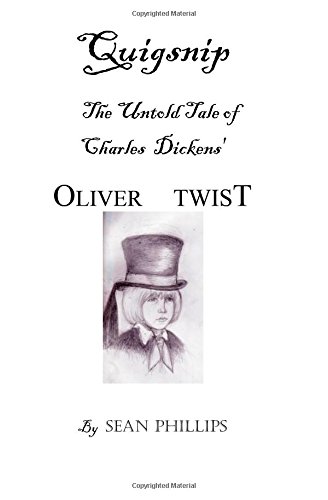
One of those coulda-been avenues in Twist concerns a possible villain, a strange humpbacked person who enters the narrative for a few paragraphs and is never seen again. Writer Sean Phillips has grabbed that character, or rather that possibility of a character, and turned him into the villain Fagin's unseen boss, the vulgar and nasty Mr. Quigsnip, and has created a fun, albeit ungainly adventure in which Quigsnip goes after Oliver for some revenge.
I call this ungainly because it is a self-published book that could use an editor to clear away some misspellings and formatting issues, and so what the novel feels like is a promising first draft. The structure of the story is well-paced, exciting, and some of the research seems very thorough. The late 1830s saw Londoners finally start reacting against the workhouses that had sprung up around the capital years previously, keeping the city's underclass in a permanent state of thrall and poverty, and this story reflects the beginning of this social change.
The prose is clear, and I was never confused by the events. Given a little more work, this could be developed into a good adventure story. With a pair of exceptions, I thought this was a well done first effort, and I certainly enjoyed the climax, which incorporates the "ghost" stage effect that unnerved so many theater-goers of the period. Unfortunately, I was not sold on a plot strand that required Oliver Twist to be hypnotized. A strong editor could have provided a good deal of help to Phillips, building something promising into something satisfying.
Nevertheless, despite these quite major fumbles, the book was an entertaining diversion. It might have helped that Phillips is clearly paying tribute, not just to Dickens' characters but to his worldview. Dickens, for all his melodrama and romanticism, was a critic of society's failings and of inequality. The heroes of Quigsnip are continuing to make the changes in their world that Dickens had them striving toward in his original novel (probably all of his novels, actually), and so the story certainly rings true and may appeal to Dickens' fans and collectors. Given the hiccups of the formatting, and that hypnotism malarkey, I can't give this a very strong recommendation, but I would encourage the author to keep at it, and possibly hire an editor to help beat this edition into better shape for a revised version that may find home with a publisher and a larger audience.
A copy of this book was provided by the publisher for the purpose of review. If you'd like to see your books (typically comics or detective fiction) featured here, send me an email.
No comments:
Post a Comment